May 2, 2023
A new garden of Eden: Eden Theological Seminary’s Gleaning and Garden Project flourishes

More than just a space to grow food, the seminary garden serves as a hub for local gardeners and community activists pursuing racial and economic justice.
In an inconspicuous corner of the campus of Eden Theological Seminary in St. Louis, Missouri, a gathering of leaders considers what will rise in this spot later this year. But this is no contruction site. This is a garden.
It is now a patch of bare earth, with no sign of the greens, tomatoes and other food that will sprout there. But as the Rev. Dr. Kristen Leslie points out to the group, it’s warmed by full, direct sun, even on this chilly April day.
“The okra really love that,” says Leslie, the Harold Peters Schultz Professor of Pastoral Theology and Care at Eden and co-director of the garden project.
By late summer, the gorgeous, conical okra pods will be silhouetted against the blue of the late afternoon sky, their organic architecture echoing the spires of the seminary’s main academic building.
“This was all a parking lot, so we had to bring in truckloads of soil to get started, but we add a little more each year,” Leslie says to the group, which includes the Rev. Dr. Heber Brown III, the founder of the Black Church Food Security Network; the Rev. Karen Pepmeier, co-director of the project; and a smattering of Eden alumni and students.
They’re looking at the garden of Eden — or, officially, the Eden Gleaning and Garden Project.
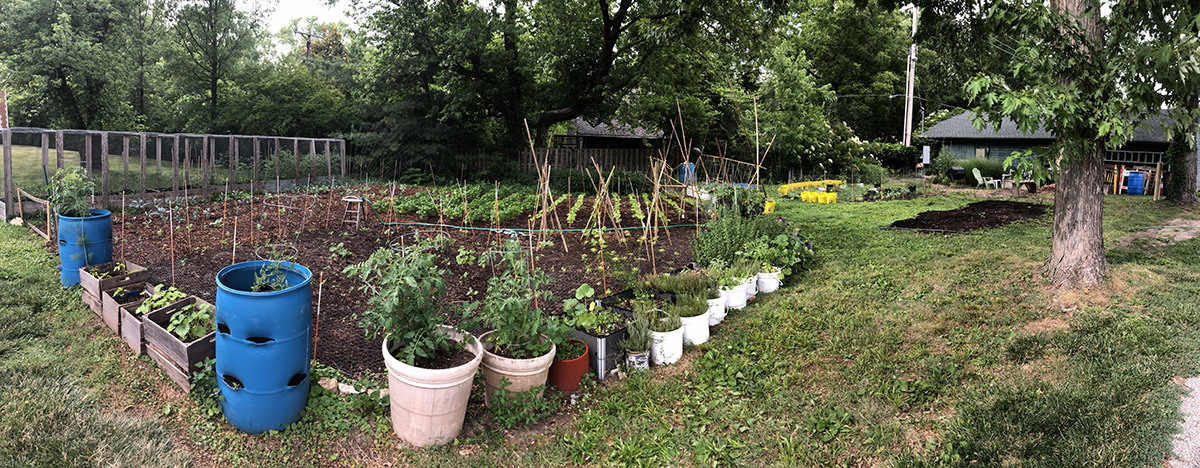
In 2022, through the efforts of dozens of volunteers and a handful of farmers, the project grew, gleaned and delivered over 14,000 pounds of fresh produce for distribution by feeding ministries and food banks in St. Louis.
But the four-year-old project is about more than fresh veggies. It is about the restorative work of entire systems through relationship and collective imagination.
What began as a simple garden now includes gleaning efforts with farmers two states away, as well as local community support through teaching new gardeners basic skills and providing supplies for simple container gardens.
Its latest commitment is to support a pastor in nearby Herculaneum, Missouri, who plans to turn the site of her town’s historic racially segregated schoolhouse into a center for place-based witness and healing.
Underlying all of this is a shared belief that local efforts by faith communities present a unique opportunity for relationships — to food, land and each other — to lead the way toward restorative justice in the mending of creation.
During their remarks at Eden’s annual spring convocation the previous day, Leslie and Brown, who is a national leader in creating Black food ecosystems, highlighted the connections among food security, pastoral care and grassroots efforts to offer healthy food to people in need.
“We’re not interested in creating new infrastructures,” Leslie said. “Instead, we work with preexisting organizations and build relationships. By operating through a relational network, … we can respond to the actual needs of our community and to the offerings of those with gifts to give.”
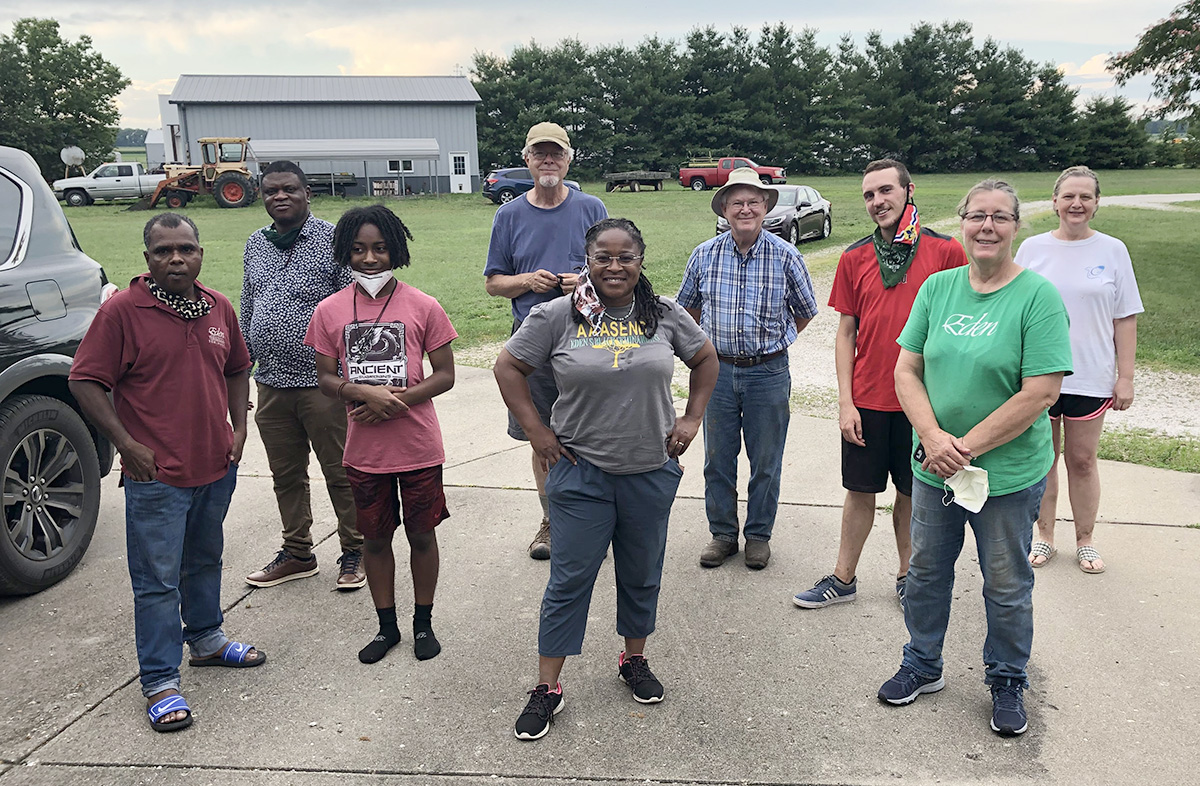
It started with an email
On Aug. 25, 2019, Pepmeier, then an Eden student, sent an email to Leslie wondering whether Leslie would be able to distribute some potatoes. One thousand pounds of potatoes were going to rot if someone didn’t claim them.
Pepmeier, who is from a rural farming community in Vincennes, Indiana, knew that Leslie worked with unhoused populations in St. Louis. She hoped to connect to a food ministry where the produce wouldn’t go to waste.
Plowing unharvested crops into the ground is common practice for many of the farmers, who grow produce for grocery chains, Pepmeier said.
In these operations, migrant workers harvest the crops once during a growing season, then move on to other areas of the country. Farmers lack the workers or the money for additional harvests, even though the plants keep producing enough for two or three, she said.
“All that produce is just left in the field to be tilled into the ground at the end of the season,” Pepmeier said.
Leslie had no difficulty finding food ministries that were thrilled to offer the potatoes. A seed was planted: How could Leslie and Pepmeier find ways to get more fresh produce to those who need it most?
They began a two-pronged approach in 2020. First they began conversations with farmers and restaurants to glean produce and perishables such as eggs and bread. By summer 2020, they made their first trip to Indiana to glean corn and potatoes.
They also planted a vegetable garden on Eden’s campus. Located next to the maintenance sheds, the garden site had only a thin layer of topsoil on top of a former parking lot. Leslie credits Pepmeier’s gardening experience and wisdom with their growing success.
“The first year, we planted what we wanted, gifting it to local food ministries I knew of through my work with unhoused folks,” Leslie said. “The second year, we asked the food ministries directly, ‘What would you like us to grow for you?’”
Produce is donated to preexisting ministries, such as the robust feeding ministry through Centennial Christian Church, where vegetables from the project make their way into free, balanced meals for the community.
How do organizations in your community partner with each other to provide fresh food for those who need it?
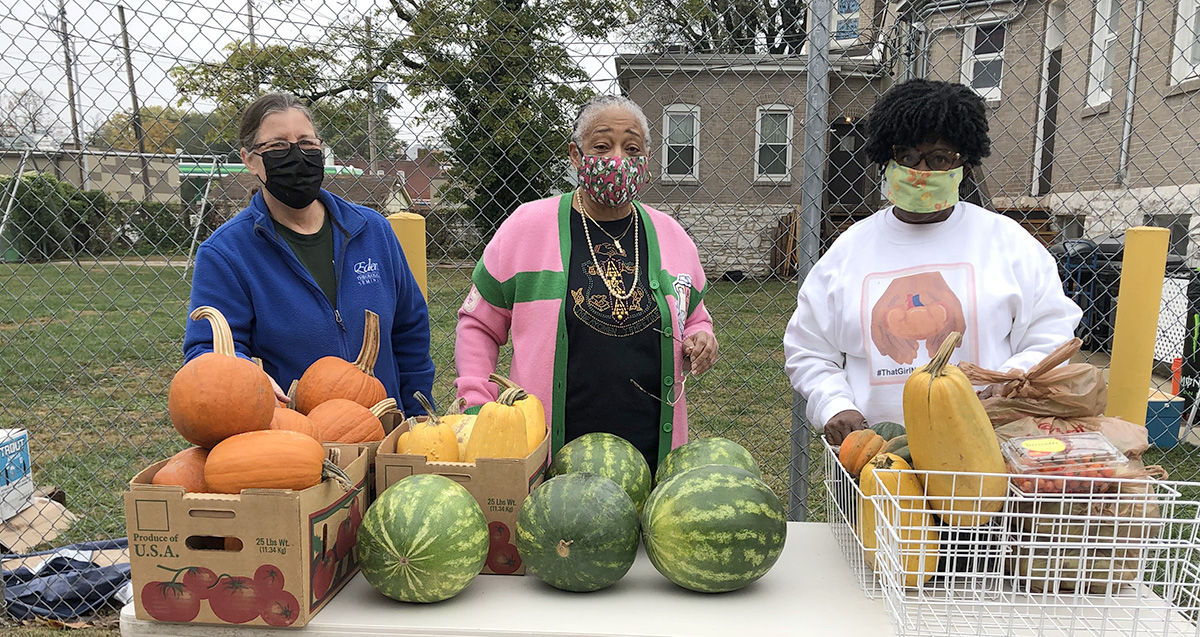
The Gleaning and Garden Project makes fresh produce more readily available to the over 18% of St. Louis residents who, according to the USDA, live in a food desert, with no easy access to grocery stores.
As Leslie and Pepmeier were attempting to cultivate an oasis, the national conversation around food insecurity offered new language that clarified the scope of their work.
Food justice activist Karen Washington coined the term “food apartheid” — reflecting the racial, geographical, religious and economic aspects of food systems — to replace the term “food desert.”
And Brown’s work with the Black Church Food Security Network helped illuminate the racial dimension of food insecurity across the country, including in St. Louis.
According to a 2019 report by the Interdisciplinary Environmental Clinic at Washington University School of Law, Black residents of St. Louis are more than twice as likely as white residents to have limited access to healthy food, a fact that the report authors cite as an act of environmental racism.
“Pastoral care takes place in the public arena,” Leslie said. “When we engage in community and with the land, we engage directly with unjust systems. When we garden and glean, we interrupt those systems. That is healing work. Transformative work.”
‘Let’s think bigger …’
As the project evolved, Leslie and Pepmeier began to see how transformative it could be.
They continued to focus on the relationships and connections that came from gleaning and gardening in community. “We were doing good work, but Kristen said, ‘Let’s think bigger!’” Pepmeier said.
What is the role of faith communities in providing fresh food for those who need it?
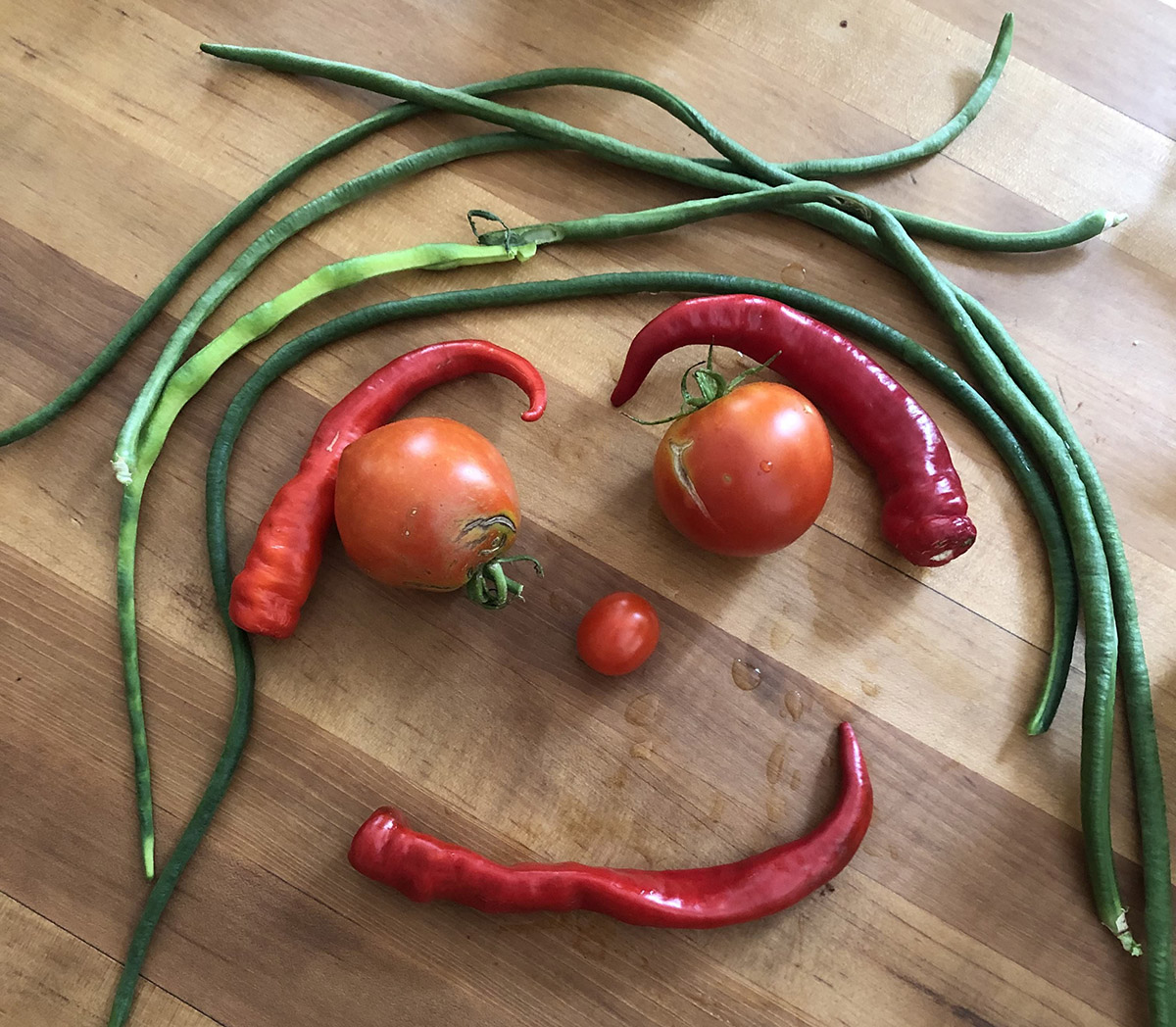
It was around this time that Leslie asked the Rev. Gabrielle Kennedy whether the project could partner with Faith HEALS, an organization dedicated to improving the health and well-being of African Americans in St. Louis.
The idea: distribute produce to people coming to pop-up COVID testing sites Kennedy coordinated in the early months of the pandemic.
An Eden graduate, Kennedy also was serving as pastor at Buren Chapel AME in Herculaneum, Missouri, a town about a half-hour drive south of the seminary on the Mississippi River.
As Kennedy saw firsthand the ways that organizations and churches could partner with communities around food, health and wellness, she felt something click.
“This could be it,” she remembers thinking when she toured the Eden garden and gleaned with other volunteers.
Under her leadership, Buren Chapel joined the Black Church Food Security Network and built three raised garden beds on a long strip of mown grass leading up to Buren Chapel’s tidy sanctuary — soon to be expanded to 10 beds.
The garden would sustain the congregation through the lockdown days of the pandemic.
“That garden has kept our church alive,” Kennedy said. “It was something we could do safely when we couldn’t gather indoors. It gave us something to look forward to, to rally around, and everyone in our community could get involved.”
Through the garden, the church has fostered partnerships with local schools, people in Herculaneum and the Cooperative Extension of Lincoln University, an HBCU in Mid-Missouri.
But Kennedy’s vision is much larger. In 2022, she helped launch the Buren-Douglass Healing Center. As their first task, they acquired the historic Douglass Schoolhouse and adjoining property. The school, named after Frederick Douglass, was founded in 1912 as the school for Black students, which it served in two locations until desegregation in 1957.
“I have congregation members who were the last kindergarten class to attend there before the schools were desegregated, so its history really means something to us,” Kennedy said. “We don’t want that forgotten.”
Another part of the community’s story is one of ecological degradation.
For more than 100 years, the town was the site of one of the largest lead smelting operations in the country. The Doe Run Company’s Herculaneum smelter closed in 2013 in compliance with an agreement with the U.S. Environmental Protection Agency.
Herculaneum underwent a mandated remediation, which included razing houses and removing topsoil contaminated with lead dust. Because the pollution most affected historically Black-owned and Black-occupied properties in town, the remediation also deeply disrupted the Black community.
Kennedy wants the new center to be a place that is “ecologically grounded, honors natural resources, and invites people to come and spend time.”
“We want to honor the history of the land and the people who lived here, to tell the stories of harm,” Kennedy said, “but also to offer the community an experience of a place that is being healed.”
Kennedy said she sees her work in creation care as a reversal of historical and institutional stresses placed on Black Americans. And doing so in community offers Kennedy glimpses of grace.
“There are few examples of God’s love as pure and straightforward as watching a garden grow, as watching the provision of food in real time,” she said. “And justice is woven into it all when a person can see how they participated in some aspect of bringing their own food into being. There is a deep dignity there.”
How does your local congregation steward the land it owns? Does it support land stewardship in the surrounding community?
Connections and community
As a community organizer, Kennedy ensured that the seeds of the Buren-Douglass Healing Center were rooted in local resources.
“We want to build this place through connections and community,” she said. “People think the work we’re doing is about building a garden, but the real work is about building trust.”
Kennedy reached out to the Eden Gleaning and Garden Project to serve as a hub for generative conversations about resource sharing, visions for the center and future endeavors.
Leslie sees the project’s role as a supporting one.
“I can’t step in as an expert,” she said; community members are the experts of their own contexts. “But I can share what we’ve done and foster conversations where folks can share dreams, connections and resources while building relationships.”
In the fall of 2022, the project hosted a meal and space for Kennedy and seven other Black women to gather at the garden at the seminary.
“We’re moving at the speed of trust,” Leslie said. “But already, there’s so much energy and excitement around the healing potential of connecting to others and to the land in liberative ways.”
Kennedy agreed, confident that new partnerships will continue to emerge.
“Really, anyone is welcome at the table. There are so many doorways into this work, which tells me that it’s not just about one kind of people’s liberation; it’s about collective liberation,” she said.
How does growing food heal us and our relationship with the land?
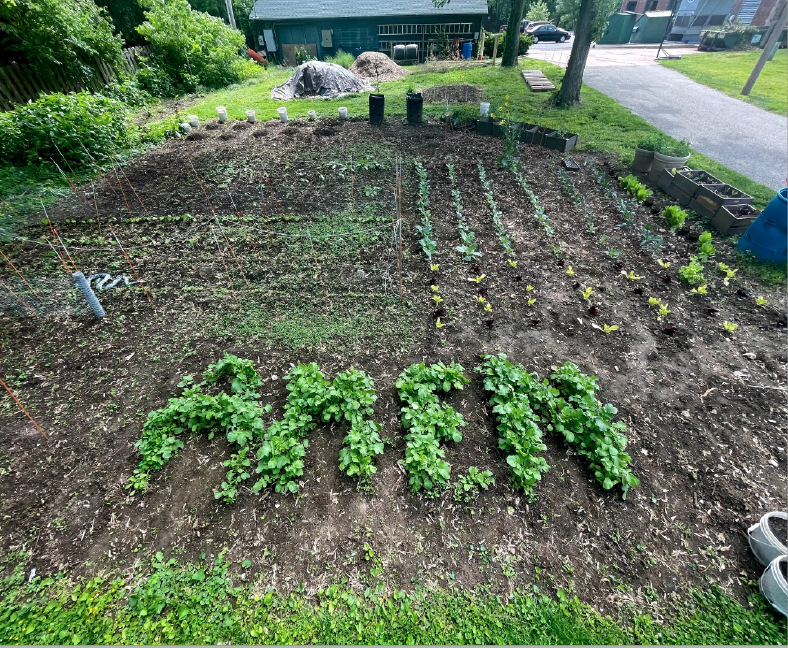
Less tangible harvests
While Kennedy prepares the soil in Herculaneum, Leslie and Pepmeier have continued to lead gleaning trips, workshops and a community course on the project through Eden.
Participants read the gleaning codes of Deuteronomy and Leviticus alongside the history of United States land policy, such as the Homestead Act of 1862 and the swift 1865 overturn of the “40 acres and a mule” promise to former slaves.
Reflecting on the less tangible harvests of the project, Pepmeier noted the instantaneous yet deep-rooted connections that have emerged among volunteers who were strangers prior to meeting in the fields.
“I can even see a change in the farmers,” Pepmeier said. She got a call in 2022 from a farmer she had known for years, she said. She’d gleaned his fields earlier that season.
But now he wanted to help in another way. He had paid his workers to harvest a field for a second time, knowing that the crops would be donated, not sold to market.
“He self-initiated a food distribution. That never would have happened before,” she said.
It’s one example of how the Eden Gleaning and Garden Project has become a kind of farm-to-table fellowship, where good, nourishing meals are blessed by many on their way to the plate.
“A garden is a resource,” said Pat Pendleton, of Centennial Christian Church. “But is a garden just resource for produce? Or is it also for connection? Healing? Relationship?”
How does growing and gleaning food bring us closer to understanding God’s justice?
Questions to consider
- How do organizations in your community partner with each other to provide fresh food for those who need it?
- What is the role of faith communities in that work?
- How does your local congregation steward the land it owns? Does it support land stewardship in the surrounding community?
- How does growing food heal us and our relationship with the land?
- How does growing and gleaning food bring us closer to understanding God’s justice?
